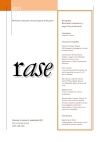Gender and social background: big diferences in drop out and little in performance
DOI:
https://doi.org/10.7203/RASE.4.3.8729Keywords:
gender, social class, social origin, scholastic failure, education policy, human capital, PISA, educational performance, education, inequality of opportunities. Abstract
Abstract
In this article the debates on the sociology of education that deal with the inequality of educational opportunities are gone over briefly, with special attention given to Raymond Boudon´s suggestions on methodological individualism. This theoretical debate is illustrated with the difference between educational performance (level of knowledge) and educational achievement (titles obtained). Employing data from PISA and from the Survey of the Labour Force, it is shown that in educational performance, gender and social origin differences are less than in educational achievement, taking the graduation of Obligatory Secondary Education (Graduado en Educación Secundaria Obligatoria) as a marker of educational achievement. After the assessment of this fact, two families of hypothesis can be put forward to explain it. One refers to an artifact effect (problems of measuring different educational requirements). The other considers that there could be social processes that augment differences in educational performance when the time comes to transforming it to educational achievement. These processes could be due to factors that exist within the education system itself, such as the curriculum, or factors outside the system, such as the attraction the job market has for working class youngsters.
 Downloads
Downloads
Downloads
Published
How to Cite
-
Abstract1814
-
PDF (Español)1164
Issue
Section
License
![]()
This work is licensed under a Creative Commons Reconocimiento-NoComercial-CompartirIgual 4.0 Internacional.




